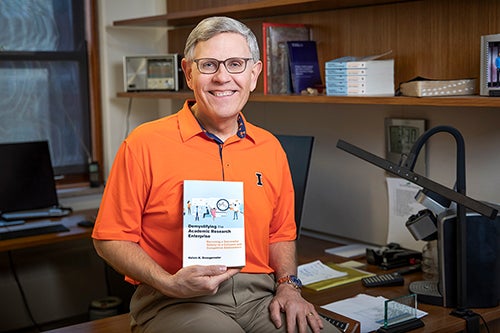Book: What scholars need to know to thrive in the competitive world of research, creative enterprise

Before his service as director of the White House Office of Science and Technology Policy and science advisor in 2019, meteorology professor Kelvin Droegemeier developed an online course designed to give researchers from all disciplines the skills needed to navigate the complex landscape of scholarly endeavor. Droegemeier thought that there was a lot of valuable information in those videos, so he wanted to share them with a much broader audience.
In the book “Demystifying the Academic Research Enterprise: Becoming a Successful Scholar in a Complex and Competitive Environment,” Droegemeier, now a climate, meteorology, and atmospheric sciences professor at the University of Illinois Urbana-Champaign, transformed his videos into a written resource to help students, emerging scholars, college administrators, policymakers – anyone who interacts with the academic research enterprise – approach the aspects of research and creative activity not traditionally taught in a classroom.
“It took me 40 years to master some of this stuff, so I figured why not make this information available to students, faculty, postdoctoral researchers and early career professionals at the front end of their career,” Droegemeier said. “The book is also useful to seasoned professionals who may be entering a new career phase or looking to build up their research programs and is designed to help scholars of all disciplines – from the sciences, arts, humanities and beyond.”
The book focuses on the role of curiosity in research and creative activity, funding dynamics, grant proposal writing and evaluation, bias, merit review, ethics and communication with the public – to name a few – and does so in a way that the reader can put these topics in the context of their career trajectory.
Droegemeier noted that the book is not a “how-to” book or user guide in any sense. Readers need not study the book front to back. It’s designed to be referred to in sections that apply to an individual at different times in their career.
“I wrote the book in a conversational style to serve as both a reference and a textbook. It has short exercises to assess your understanding and some deep-dive exercises that might take a month to complete with an advisor’s guidance,” he said.
The work can also be valuable for institutions and individuals with fewer resources or those who are traditionally underserved or underrepresented. It provides practical, real-world guidance for building and strengthening research programs.
And for the first time this spring, Droegemeier offered a new class at Illinois called “Foundations of Academic Research and Creative Activity.” It’s based on the new book and is receiving positive feedback from his students, he said.
“One of my students contacted me early in the semester to tell me that her cousin traveled to Washington, D.C., to discuss funding for a particular major program with Congressional leaders,” Droegemeier said. “My student was able to answer many of his questions about what to say and what the process would be like after just four weeks in my class.”
Droegemeier’s primary goal for this work is to let people who engage in research and creative activity know that there is a free resource – written by somebody who’s walked the path – that can empower them to be successful and give a broader view of the word early in their career.
“I published the book open access at MIT Press so everyone could download it for free. I wanted no barriers to access,” he said.
When asked why he undertook such a major project at an especially busy time in his career, Droegemeier said that he “wanted to give people a benefit that I didn’t have and let them know somebody cared enough to create a resource just for them.”






